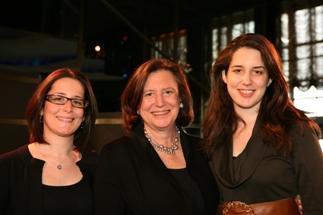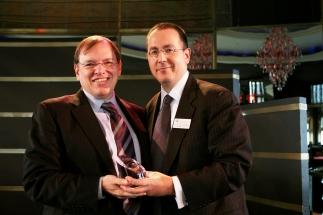2008 Lawrence A. Wien Prize Awarded
Press contact: Erin St. John Kelly [email protected]
Office 212-854-1787 Cell: 646-284-8549 Public Affairs 212-854-2650
November 18, 2008 (NEW YORK) – Columbia Law School gave its annual Lawrence A. Wien Prize for Social Responsibility to Ellen V. Futter ’74 and Judge Gerard E. Lynch ’75 today at the Rainbow Room at Rockefeller Center. Remarks by the honorees, by Wien’s granddaughter Cynthia Malkin Blumenthal and by Dean David M. Schizer all recognized the influence of family .
While Futter and Lynch have used their law degrees to pursue very different careers, both spoke with humor and warmth about their connection to Columbia Law School and both rooted their work in public service to the families that raised them.
Futter, whose father Victor Futter ’42 taught at the Law School, whose daughter Anne Shutkin is a 2008 graduate and whose daughter Elizabeth will matriculate in 2009, called the Law School “near and dear to my heart.” She said her lawyer father instilled in her a “fundamental admonition to tell the truth,” and she called being a lawyer “a grand tradition and a noble profession.”
|
|
Ellen Futter '74 (center) with her daughters Anne Shutkin '08 (left) and Elizabeth Shutkin '12. |
Cynthia Malkin Blumenthal, Lawrence Wien’s granddaughter, made introductory remarks at the awards luncheon. She described Wien’s highest purpose as serving the public good. “He would be honored and thrilled by today’s recipients,” she said, and closed with, “I urge all of us to live up to my grandfather’s belief that anything is possible if we all work on it together.”
Ellen Futter graduated from Barnard in 1971 and from Columbia Law School in 1974. Despite telling the audience, “I was raised to be a to be a law firm associate,” she worked for one year as an associate at Milbank, Tweed, Hadley & McCloy and then served as Barnard’s president for the next 13 years, the youngest person ever to head a major U.S. college.
Futter left Barnard in 1993 to become the president of the American Museum of Natural History where, among other accomplishments, she has spearheaded the construction of the Rose Center for Earth and Space and has doubled the number of annual visitors. She serves as a director on a number of corporate and non-profit boards including JPMorgan Chase and Memorial Sloan Kettering Cancer Center. She is also a fellow of the American Academy of Arts and Sciences and a member of the Council on Foreign Relations.
Judge Lynch said in accepting his Wien Prize, “I do what I do simply because that was the way I was brought up. I always knew to do the right thing,” he said, but at Columbia Law School, “I learned the importance of doing it right.”
|
|
Gerard Lynch '75 (left) accepts the Wien Prize for Social Responsibility from Dean David M. Schizer. |
Lynch, the Paul J. Kellner Professor of Law at Columbia Law School, has been a judge for the Southern District on New York since 2000. He graduated from Columbia University in 1972 and from the Law School in 1975. After clerkships with Judge Wilfred Feinberg and Justice William J. Brennan, Jr., he joined the Columbia Law School faculty in 1977. He received the student-voted Willis Reese Award for Excellence in Teaching in 1994 and in 1997 received the University-wide President's Award for Outstanding Teaching, the first Law School faculty recipient of the prize.
The Lawrence A. Wien Prize For Social Responsibility honors individual attorneys who, like Lawrence Wien ’27, put their resources and legal skills to work for the public good. The recipients serve as positive role models for both the profession and law students. The prize, established in 1982 at both the Law and Business Schools, is bestowed annually with the participation of the Wien family. Since 1996, in consultation with Mr. Wien’s descendents, the award has been bestowed solely by the Law School.
Columbia Law School, founded in 1858, stands at the forefront of legal education and of the law in a global society. Columbia Law School joins traditional strengths in international and comparative law, constitutional law, administrative law, business law and human rights law with pioneering work in the areas of intellectual property, digital technology, sexuality and gender, and criminal law.

